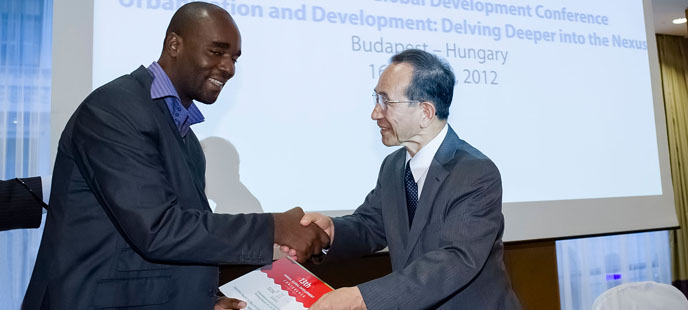
| Dr. Akio Hosono awarding a researcher at the AMC 2011 Prize Ceremony |
Journalist Khanh Phuong, from the Newspaper of Construction, Ministry of Construction, Vietnam interviewed Dr. Akio Hosono, Director of Japan International Cooperation Agency Research Institute (JICA-RI) during the GDN 13th Annual Global Development Conference in Budapest, Hungary to understand JICA-RI’s goals and the Japanese government’s partnership with GDN in the long-term.
KP: So far, the Japanese government has supported GDN through the Most Innovative Development Projects (MIDP) and Outstanding Research on Development (ORD) Awards. What are the main targets of these awards?
Dr. AH: The main inspiration for the Japanese government behind supporting GDN through the mentioned awards is to be able to recognize and fund innovative, early stage projects that have high potential for development impact in exceptionally marginalized and disadvantaged groups located in developing and emerging countries, which can be replicated as many times, in similar settings for wider achievements. Although the projects need not be theme-based, they should be practical and helpful for the community, realistic and applicable and have a proven positive impact. We expect more participants and more candidates to join in the program.
KP: Do you have anything in mind about the long-term cooperation between GDN and the Japanese government, in general and JICA-RI, in particular?
Dr. AH: From the beginning, the Japanese government, specifically the Ministry of Finance and JICA-RI have whole-heartedly supported GDN. The Japanese Award for 'Outstanding Research on Development' already confers prizes of up to US$45,000 plus travel expenses to the annual conference. We are committed to continue supporting both the tangible and intellectual aspects of the awards program. Although currently, Japan is facing difficulty due to last year’s disaster, we are still supporting GDN in the context of promoting international development collaboration by funding researchers, and we hope that through our continued and concerted efforts, the global development process will improve.
KP: Do you have any advice to researchers in developing countries?
Dr. AH: I always encourage them to participate actively, in the annual Global Development Awards and Medal Competition, which has three main categories, therefore giving researchers enough space to see which group suits their particular project best, and pitch their research work in view of that such that it makes the right impact on reviewers who can then identify the best research projects. New researchers should refer to past examples of successful projects and should not give up, if in the first attempt they are not successful because GDN has a Selection Committee who work with sufficient transparency in this matter. Researchers should understand fully the eligibility criteria of each of the categories within the competition and target their contents accordingly.
KP: Have you been to Vietnam and do you have any comment on the Vietnamese development process?
Dr. AH: I had many chances to visit Vietnam and I found Vietnam very impressive. It can be seen as a model of economic development, especially in view of the recent achievement of poverty reduction. Now, Vietnam has a big middle class and they are very dynamic. JICA would be very interested and like to support the development process in Vietnam actively. However, Vietnam needs to think for the long-term to avoid the negative impacts from its swift development process.
- - -
Prior to taking up his current responsibility as Director, JICA-RI, Dr. Akio Hosono held several prominent positions throughout his distinguished career. He served as the Vice President at the Tsukuba University in Tsukuba Science City, the Japanese Ambassador to El Salvador and Professor at the National Graduate Institute for Policy Studies in Tokyo. He became a Senior Advisor at the JICA in 2007 and joined JICA-RI as a Senior Research Fellow in 2010. His field of research focuses on international development theory, especially concerning experiences of development and Japanese cooperation.
NOTE: Read more about the Global Development Awards and Medals Competition 2011
